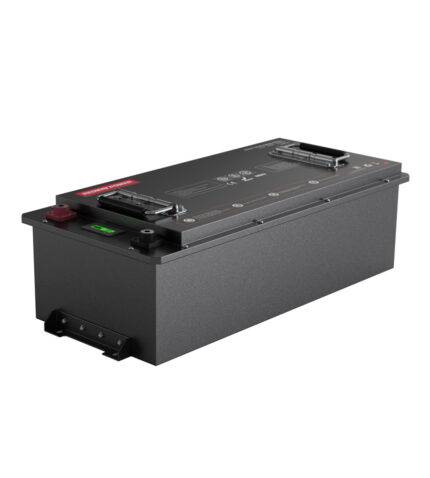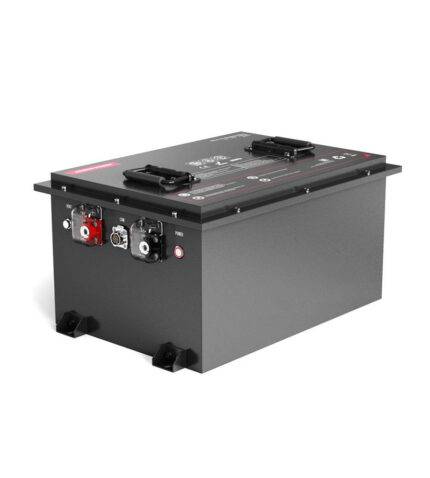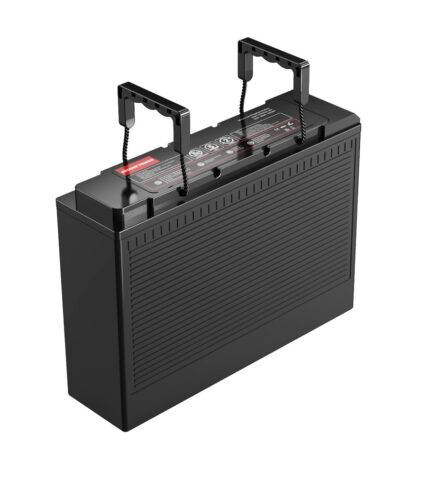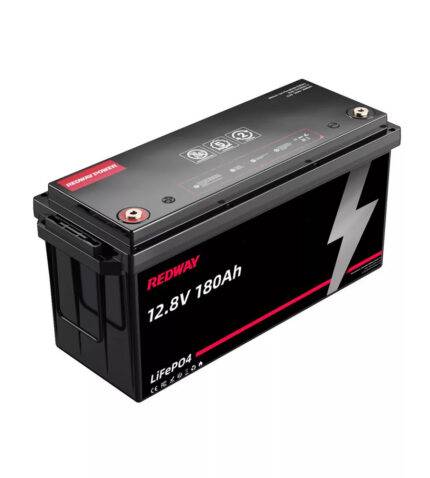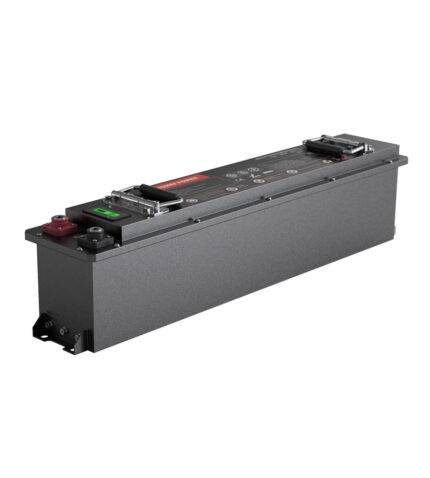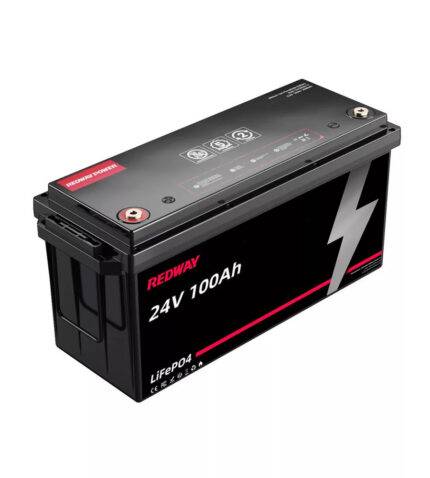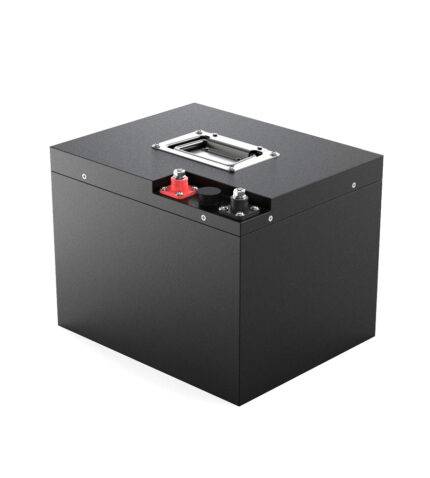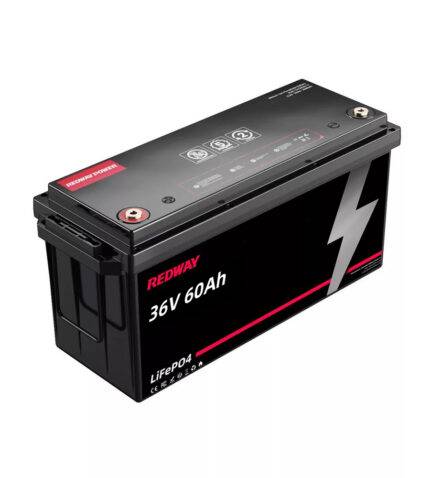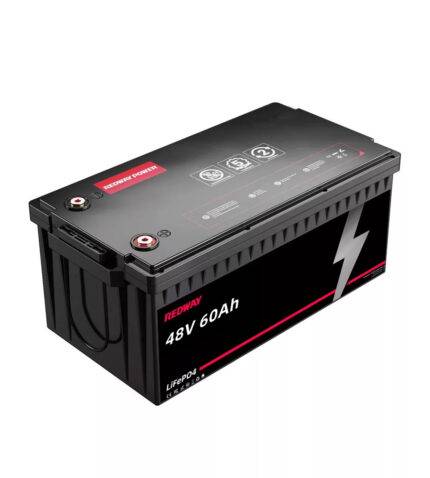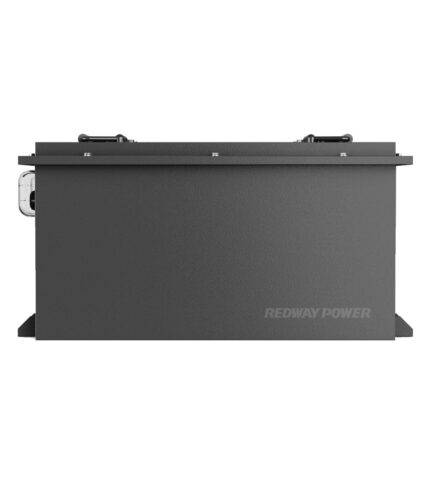- Rack-mounted Lithium Battery
- Golf Cart Lithium Battery
-
Golf Cart Lithium Battery
- 36V 50Ah (for Golf Carts)
- 36V 80Ah (for Golf Carts)
- 36V 100Ah (for Golf Carts)
- 48V 50Ah (for Golf Carts)
- 48V 100Ah (Discharge 100A for Golf Carts)
- 48V 100Ah (Discharge 150A for Golf Carts)
- 48V 100Ah (Discharge 200A for Golf Carts)
- 48V 120Ah (for Golf Carts)
- 48V 150Ah (for Golf Carts)
- 48V 160Ah (Discharge 100A for Golf Carts)
- 48V 160Ah (Discharge 160A for Golf Carts)
-
Golf Cart Lithium Battery
- Forklift Lithium Battery
- 12V Lithium Battery
- 24V Lithium Battery
- 36V Lithium Battery
- 48V Lithium Battery
-
48V LiFePO4 Battery
- 48V 50Ah
- 48V 50Ah (for Golf Carts)
- 48V 60Ah (8D)
- 48V 100Ah (8D)
- 48V 100Ah
- 48V 100Ah (Discharge 100A for Golf Carts)
- 48V 100Ah (Discharge 150A for Golf Carts)
- 48V 100Ah (Discharge 200A for Golf Carts)
- 48V 150Ah (for Golf Carts)
- 48V 160Ah (Discharge 100A for Golf Carts)
- 48V 160Ah (Discharge 160A for Golf Carts)
-
48V LiFePO4 Battery
- 60V Lithium Battery
-
60V LiFePO4 Battery
- 60V 20Ah
- 60V 30Ah
- 60V 50Ah
- 60V 50Ah (Small Size / Side Terminal)
- 60V 100Ah (for Electric Motocycle, Electric Scooter, LSV, AGV)
- 60V 100Ah (for Forklift, AGV, Electric Scooter, Sweeper)
- 60V 150Ah (E-Motocycle / E-Scooter / E-Tricycle / Tour LSV)
- 60V 200Ah (for Forklift, AGV, Electric Scooter, Sweeper)
-
60V LiFePO4 Battery
- 72V~96V Lithium Battery
- E-Bike Battery
- All-in-One Home-ESS
- Wall-mount Battery ESS
-
Home-ESS Lithium Battery PowerWall
- 24V 100Ah 2.4kWh PW24100-S PowerWall
- 48V 50Ah 2.4kWh PW4850-S PowerWall
- 48V 50Ah 2.56kWh PW5150-S PowerWall
- 48V 100Ah 5.12kWh PW51100-F PowerWall (IP65)
- 48V 100Ah 5.12kWh PW51100-S PowerWall
- 48V 100Ah 5.12kWh PW51100-H PowerWall
- 48V 200Ah 10kWh PW51200-H PowerWall
- 48V 300Ah 15kWh PW51300-H PowerWall
PowerWall 51.2V 100Ah LiFePO4 Lithium Battery
Highly popular in Asia and Eastern Europe.
CE Certification | Home-ESS -
Home-ESS Lithium Battery PowerWall
- Portable Power Stations
48V (51.2V) 180Ah Lithium Battery
• Cell: LiFePO4
• MOQ: 50
• Delivery: 20 Days
• Customizable / OEM / ODM: Yes
• Factory: Redway, Dongguan, Guangdong, China
• Delivery Terms: FOB, EXW, CIF
• Payment: T/T, L/C, PayPal
• Sea / Air / Land Shipment: 10FT, 20FT, 40FT, 60FT
Description
Redway's production facility boasts an impressive daily capacity, exceeding 15 million battery cells and assembling up to 50,000 complete batteries. Among its popular offerings is the 48V (51.2V) 180Ah LiFePO4 battery, prized for its versatility across applications like security systems, electric wheelchairs, and backup car starting power. Backed by a 3-year warranty and reliable customer support, customers can rely on its enduring performance. Customized services are available to tailor the 48V 180Ah LiFePO4 battery to specific needs.
The Redway 48V 180Ah lithium battery, encased in a robust metal shell, serves as a rechargeable energy storage solution for various applications requiring reliable power sources. Operating at 48 volts with a capacity of 180 ampere-hours (Ah), it provides substantial energy storage for extended usage periods. The metal shell enhances durability, making it suitable for demanding environments.
Equipped with overvoltage and overcurrent protection and certified by UN38.3, IEC62133, UL, and CE, the 48V 180Ah lithium battery ensures safety in extreme conditions. Operating between -20°F and +150°F, its built-in Battery Management System (BMS) safeguards against temperature extremes. Advanced features like Bluetooth connectivity and Battery Level Indicators enhance functionality.
Maximizing its lifespan involves discharging to 80-90% depth of discharge, promoting eco-friendly and sustainable energy solutions. The 48V battery delivers ample power for impressive speeds and extended range. Proper maintenance, including using the provided charger and avoiding overcharging, ensures longevity, offering a remarkable experience combining speed, range, and durability.
Features of 48V 180Ah LiFePO4 Battery
- Maintenance-Free: Requires no watering or equalization charging, reducing operational costs and hassle.
- Long Cycle Life: Offers up to 4000 cycles, ensuring durability and cost-effectiveness.
- Fast Charging: Supports quicker recharging times compared to traditional lead-acid batteries.
- BMS: Inbuilt BMS multiple security protection.
Why choose Redway Power?
- 3-year warranty
- Custom OEM/ODM acceptable without a MOQ Request
- Original Redway factory lifepo4 battery cell with factory price and grade A quality
- Smart BMS (Battery Management System)
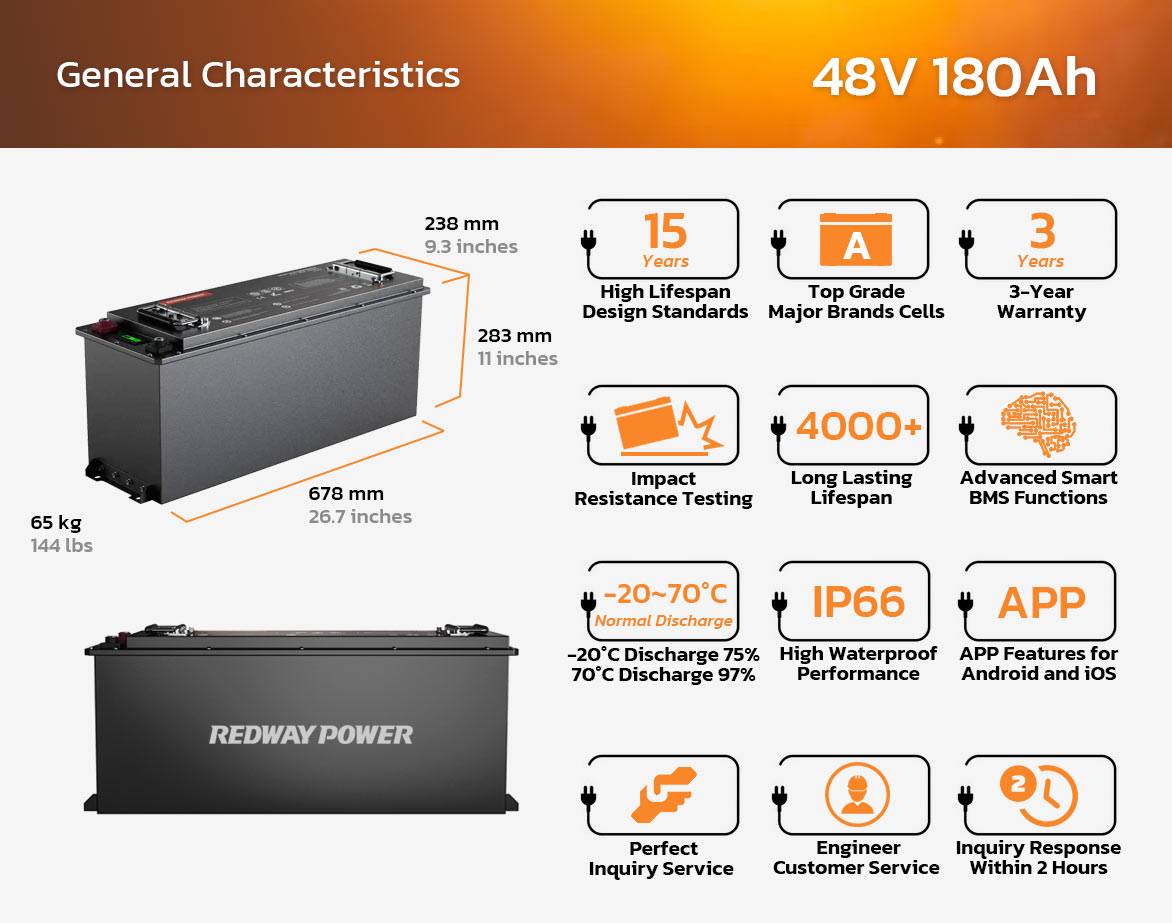
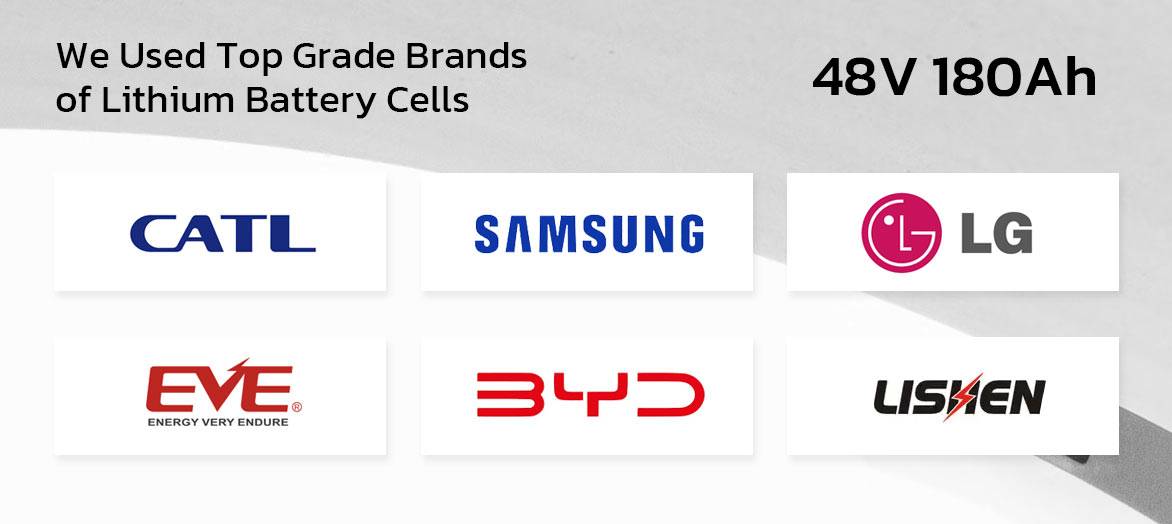
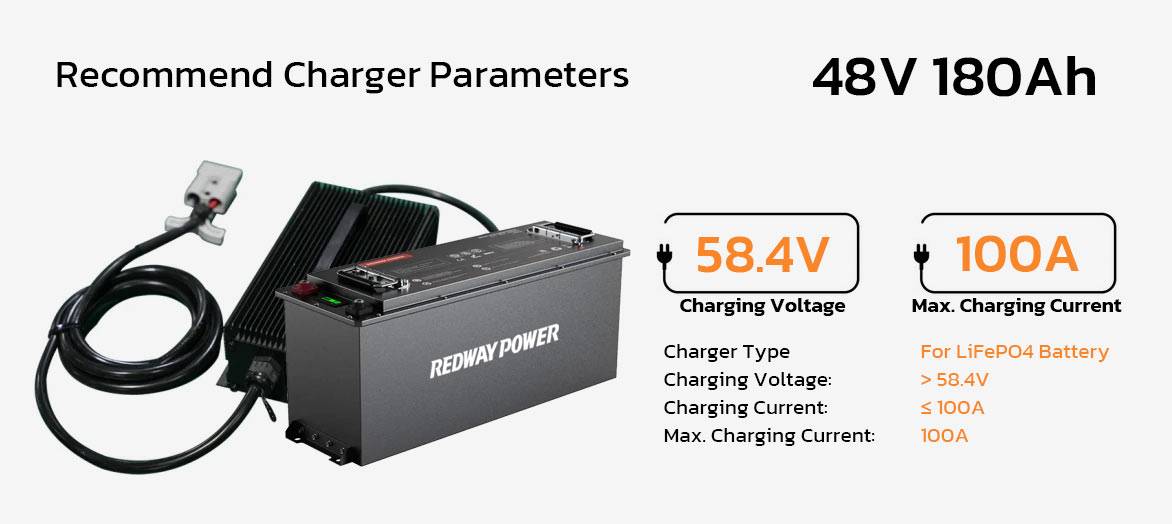
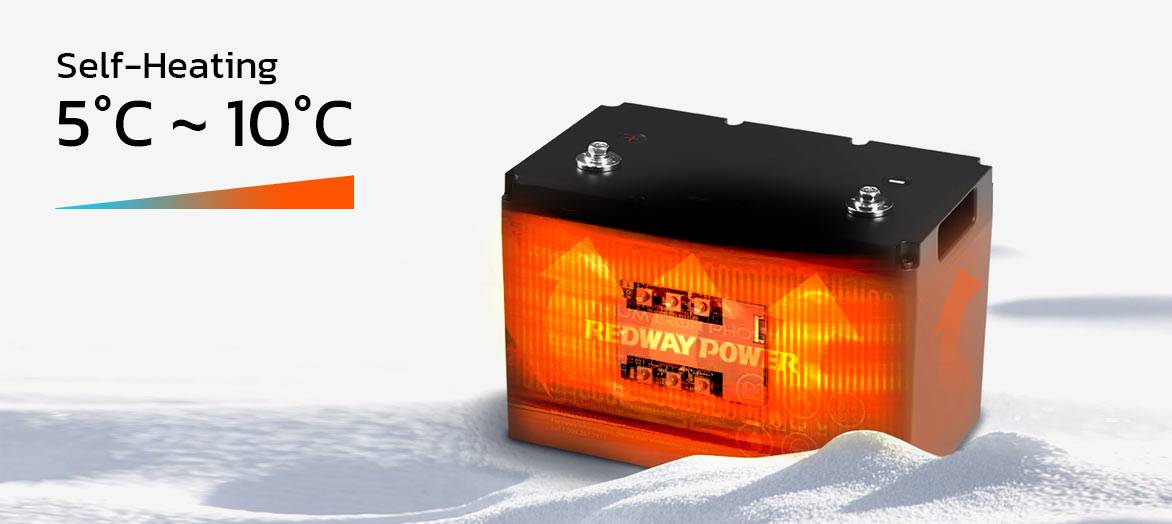
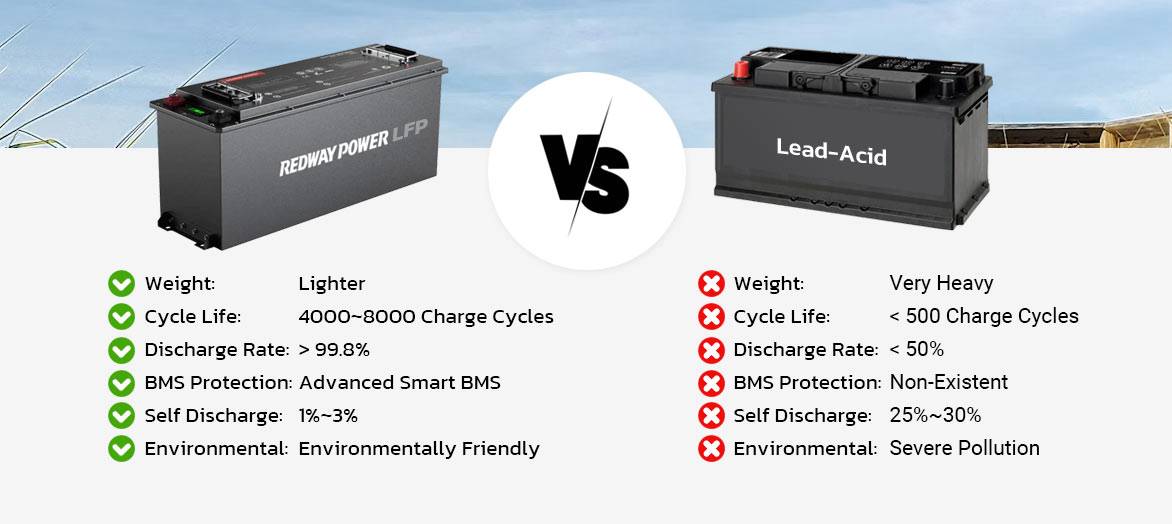
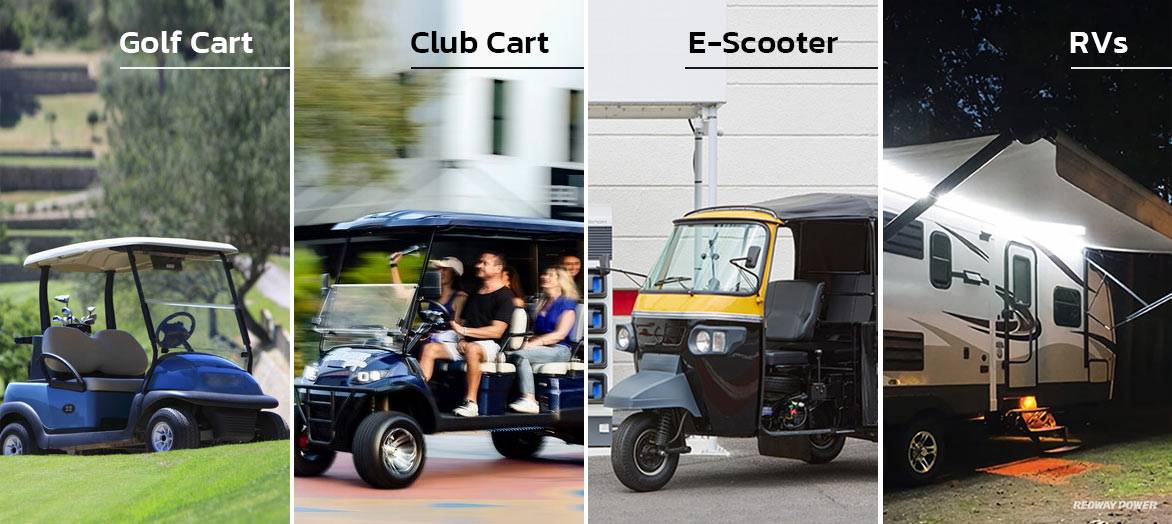
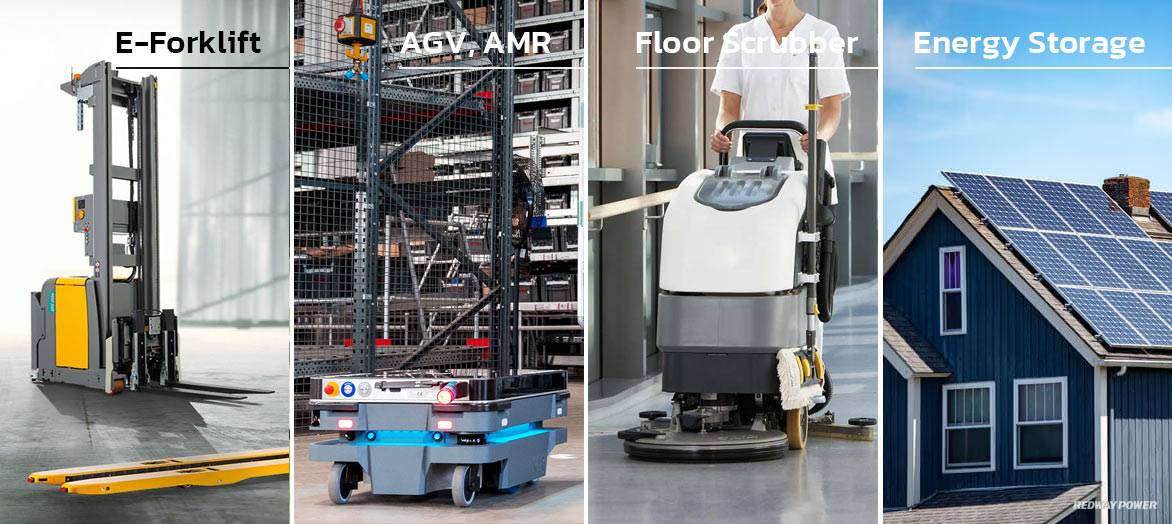
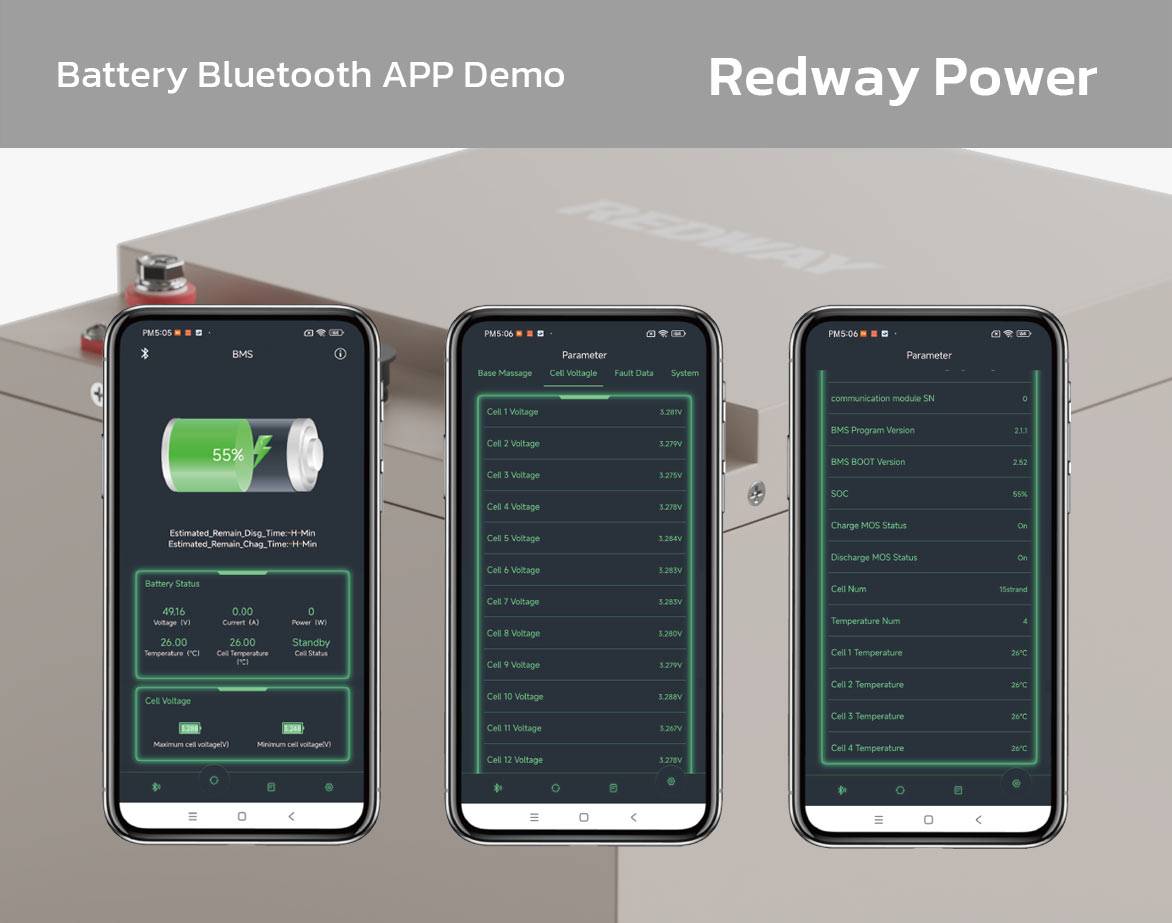
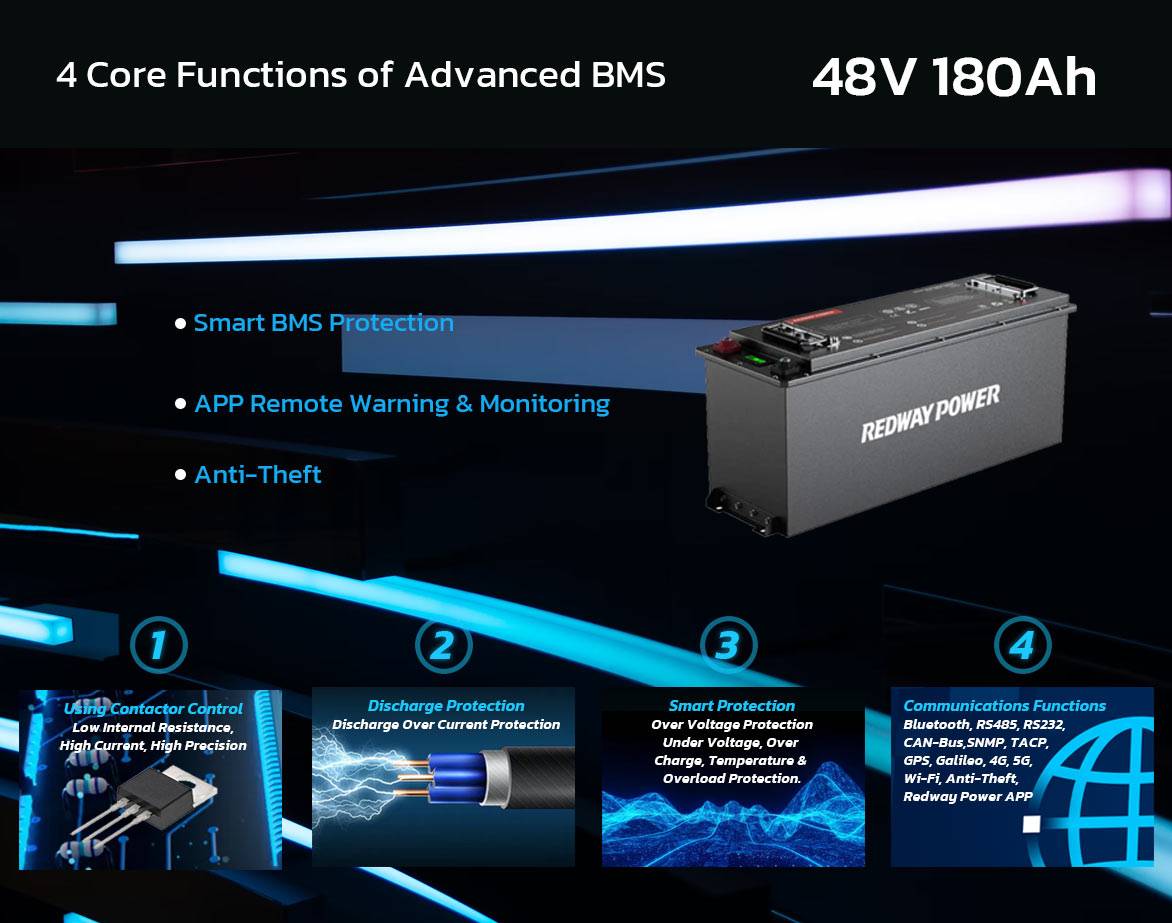
Packing & Delivery
Packaging:
- Carton box and pallet container.
- The packaging can be customized to meet different needs.
Shipping:
- New sample shipping takes 20-25 working days, while mass production requires 15-20 working days from receipt of deposit and sample confirmation.
- Sample orders ship via DHL, UPS, FedEx, or TNT, while bulk orders are sent by sea. We offer forwarding services upon request.
Our Services
OEM & ODM can customize according to your request :
- Battery voltage, capacity, and dimension.
- BMS charging and discharging current.
- Connector, case, and wire.
- Your own logo eg: silk print.
After-sales service is available :
- Respond in 24 hours to any inquiry on our product.
- Take action quickly for a normal customer’s claim within 12 hours.
- Good after-sales service: We offer 3 years quality warranty for lifepo4 batteries like 12-72V 20Ah/50Ah/100Ah/150Ah/200Ah/500Ah/1000Ah/…
- One by one tested before shipment.
FAQs
What is the wholesale price of 48V 180Ah lithium battery?
You can click contact us or phone call us. We will give you multiple options of price.
Is Redway Power a trading company or factory?
Redway Power is a company with its own factory, integrating research, development, production, and sales.
How about the quality of Redway's LiFePo4 Battery product?
Redway Power boasts over 12 years of experience in LiFePO4 battery production and is an authorized supplier for CATL and BYD.
Can you do an OEM/ODM project?
Yes, we have engineers available to assist in designing and developing any related products.
What’s your MOQ?
MOQ varies according to battery voltage and capacity.
What payment terms can we accept?
We accept TT/Paypal/West Union, etc.
Specifications
Download 48V (51.2V) 180Ah (184Ah) Lithium Battery (Metal Shell) Datasheet
Note: Our products are customizable, allowing customers to modify the main data according to their requirements.
| 48V180Ah | Specifications |
|---|---|
| Cell Type | LiFePO4 |
| Nominal Voltage | 48V (51.2V) |
| Nominal Capacity | 184Ah |
| Nominal Energy | 9420Wh |
| Charge Voltage | 58.4V |
| Discharge Voltage | 40V |
| Max. Continues Charge Current | 50A |
| Max. Continues Discharge Current | 50A |
| Dimensions [L x W x H] | 678 x 238 x 283 mm 26.7 x 9.3 x 11.1 in |
| Weight | 65.5 kg 144.4 lb |
| IP Rating | IP65 (More request) |
| Series & Parallel | 16S1P |
| Max. Battery Parallel | 4P to 37.68kWh (More request) |
| Internal Resistance | ≤30mΩ |
| Cycle Life | >4000 cycles (DOD 80%) |
| Self-Discharge | 3% (Per month) |
| Charge Temperature | 0°C ~ 60°C 32°F ~ 140°F |
| Discharge Temperature | -20°C ~ 65°C -4°F ~ 149°F |
| LCD Screen | Yes |
| Optional Functions | Bluetooth / WiFi / LED Touch Screen / RS485 / RS232 / CAN / 4G, 5G / GPS / APP |
| Charger | High current fast charger |
| BMS | Intelligent BMS protection |
| Terminal | M8 Bolts |
| Battery Case | ABS (Fireproof plastic) |
| Warranty | 3 Years |
| Silk-Screen / Label Printing | Yes |
| User Manual / Warranty Card | Yes |
| Customization / OEM / ODM | Yes |
| Shipment | Yes |
| Certifications | IEC, UN38.3, MSDS (More request) |
Applications and FAQs
The 48V 180Ah LiFePO4 batteries, housed in a metal casing, offer a significant improvement over typical deep cycle batteries. Their versatility makes them suitable for a range of purposes, including home security, outdoor expeditions, and solar-powered lighting. In contrast to standard sealed lead-acid (SLA) alternatives that usually provide only 500 cycles, these lithium iron phosphate batteries can withstand up to 4000 cycles. This impressive longevity results in a significantly lower cost per use compared to traditional batteries.
What is a 48V 180Ah lithium battery (metal shell)?
A 48V 180Ah lithium battery with a metal shell is a rechargeable energy storage device designed for various applications requiring reliable and long-lasting power sources. It operates at a voltage of 48 volts and has a capacity of 180 ampere-hours (Ah), offering substantial energy storage for extended usage periods. The metal shell provides protection to the battery cells and enhances durability, making it suitable for demanding environments and applications.
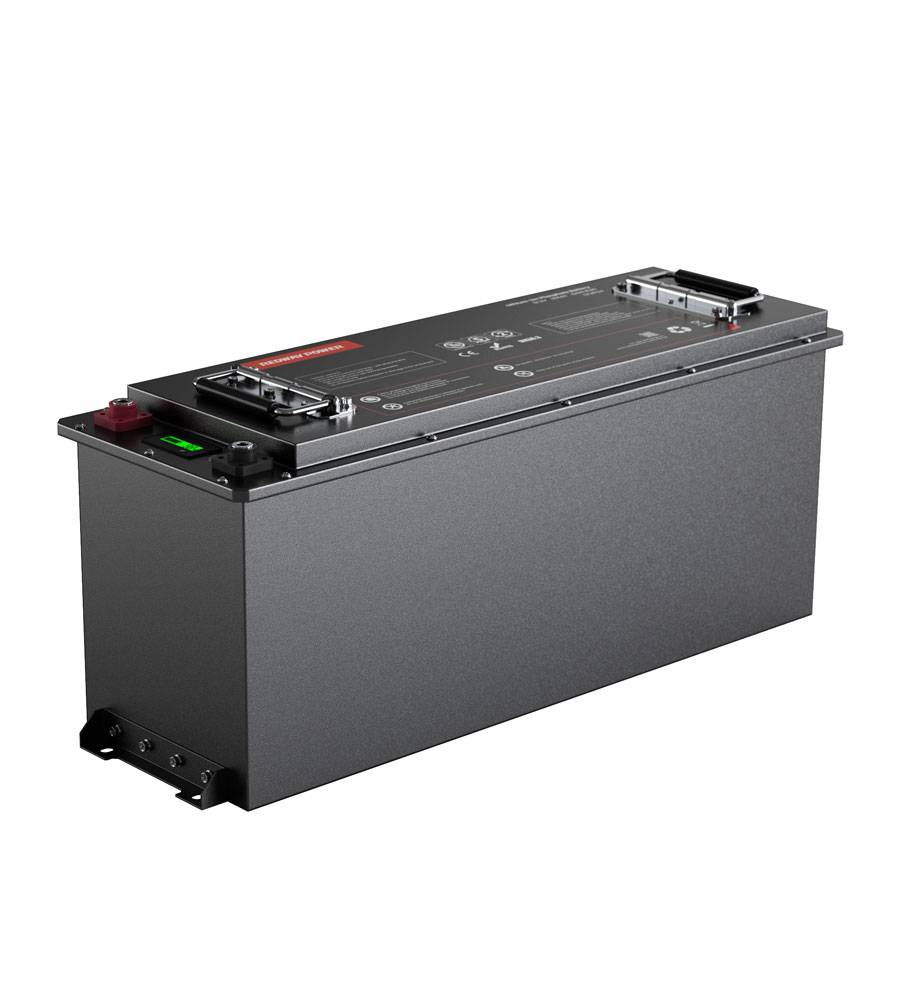
In terms of specifications, a 48V 180Ah battery can sustain a continuous current output of 10 Amperes over a discharge period of 18.4 hours, providing a total capacity of 180Ah. This translates to a substantial energy storage capacity of 8,832 Watt-hours or 8.832kWh, considering the battery's voltage of 48 volts.
In summary, a 48V 180Ah lithium battery with a metal shell offers versatility and reliability, making it ideal for industrial, commercial, and residential applications.
Why does this 48V 180Ah lithium battery use a metal shell?
The 48V 180Ah lithium battery utilizes a metal shell for several reasons:
- Enhanced Protection: The metal shell provides a sturdy outer casing that shields the battery cells from physical damage, moisture, and environmental elements, ensuring the battery's safety and longevity.
- Improved Durability: Metal shells are known for their robustness and resilience, offering resistance to impact, vibration, and other external stresses. This durability is crucial for batteries used in rugged environments or applications with high mechanical demands.
- Effective Heat Dissipation: Metal shells possess good thermal conductivity, allowing them to dissipate heat generated during battery operation efficiently. This helps prevent overheating and maintains optimal battery performance.
- Added Safety: The metal shell adds an extra layer of protection, reducing the risk of punctures, short circuits, or leakage, thus enhancing the overall safety of the battery during handling and operation.
Overall, the metal shell enhances the reliability, durability, and safety of the 48V 180Ah lithium battery, making it suitable for various industrial, commercial, and residential applications.
Where can you use a 48V 180Ah battery?
A 48V 180Ah lithium battery finds application across various sectors due to its reliable power supply and versatility:
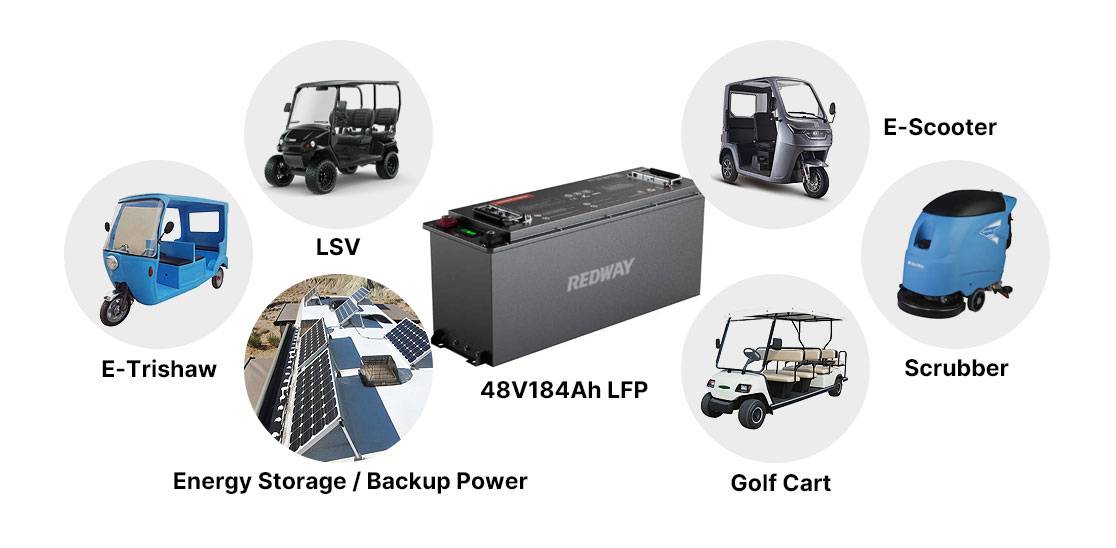
- Renewable Energy Systems: Used in off-grid and hybrid solar power systems to store excess energy generated by solar panels for later use, ensuring continuous power supply.
- Electric Vehicles: Employed in electric vehicles (EVs), including cars, buses, and scooters, as a high-capacity battery pack for propulsion, offering extended driving range and performance.
- Marine Applications: Installed in boats, yachts, and marine vessels to power onboard electronics, navigation systems, and auxiliary equipment, providing reliable energy for extended periods.
- Telecommunications: Utilized as backup power for telecommunications infrastructure, including cell towers and communication hubs, ensuring uninterrupted connectivity during power outages.
- Industrial Equipment: Integrated into industrial machinery, equipment, and backup systems to provide reliable power supply, supporting uninterrupted operations in manufacturing and production facilities.
- Emergency Backup Power: Deployed in critical facilities such as hospitals, data centers, and emergency response centers to provide backup power during grid failures or emergencies, ensuring continuous operation of essential services.
- Residential Energy Storage: Installed in homes and residential buildings as part of energy storage systems to store surplus energy from the grid or renewable sources, optimizing energy usage and providing backup power during outages.
- Commercial Applications: Used in commercial establishments, including hotels, restaurants, and retail stores, for backup power, energy storage, and load shifting to reduce electricity costs and enhance energy efficiency.
Overall, the 48V 180Ah lithium battery serves as a reliable and versatile energy storage solution across a wide range of applications, providing efficient power supply and enhancing energy resilience.
What are the advantages of a 48V 180Ah lithium-ion battery (metal shell)?
The advantages of a 48V 180Ah lithium-ion battery with a metal shell include:
- Enhanced Protection: The metal shell provides robust protection against physical damage, moisture, and environmental factors, ensuring the battery's safety and longevity.
- Efficient Heat Dissipation: Metal shells have good heat dissipation properties, effectively dispersing heat generated during battery operation, preventing overheating, and maintaining optimal performance.
- Durability: Metal shells are sturdy and resilient, offering resistance to impact and vibration, making them suitable for demanding applications or harsh environments.
- Safety: The metal shell adds an extra layer of protection against external hazards and potential punctures, reducing the risk of short circuits or leakage, and ensuring a safer operating environment.
Overall, a 48V 180Ah lithium-ion battery with a metal shell provides reliable protection, efficient heat dissipation, durability, and safety, making it an optimal choice for various industrial, commercial, and residential applications.
What are the disadvantages of a 48V 180Ah lithium battery (metal shell)?
The disadvantages of a 48V 180Ah lithium battery with a metal shell are:
- Weight: Metal shells can add weight to the battery, making it heavier and potentially less portable compared to batteries with lighter casing materials.
- Cost: The manufacturing process for metal shells may increase the overall cost of the battery, making it more expensive compared to batteries with alternative casing materials.
- Corrosion: If the metal shell is not properly treated or maintained, it may be susceptible to corrosion over time, potentially compromising the integrity of the battery casing.
- Thermal Conductivity: While metal shells offer good heat dissipation, they may also conduct heat, which could lead to thermal issues if the battery operates in extremely hot environments.
Overall, while a 48V 180Ah lithium battery with a metal shell offers various advantages, it's essential to consider these potential disadvantages when selecting the appropriate battery for specific applications.
How long will a 48V 180Ah battery (metal shell) last if fully charged?
The lifespan of a fully charged 48V 180Ah lithium battery with a metal shell depends on several factors, including the discharge rate, depth of discharge, and environmental conditions.
Assuming ideal conditions and a constant discharge rate, you can estimate the battery's runtime by dividing its capacity (180Ah) by the load's current draw (in amperes). For example, if the load draws 10 amperes, the battery would last approximately 18.4 hours (184Ah ÷ 10A = 18.4 hours).
However, actual runtime may vary based on factors such as temperature, age, and depth of discharge. It's crucial to monitor and manage these variables for accurate estimation and optimal battery performance over its lifespan.
48V 180Ah lithium battery vs lead-acid battery, which is better?
Comparing a 48V 180Ah lithium battery with a lead-acid battery involves several factors:
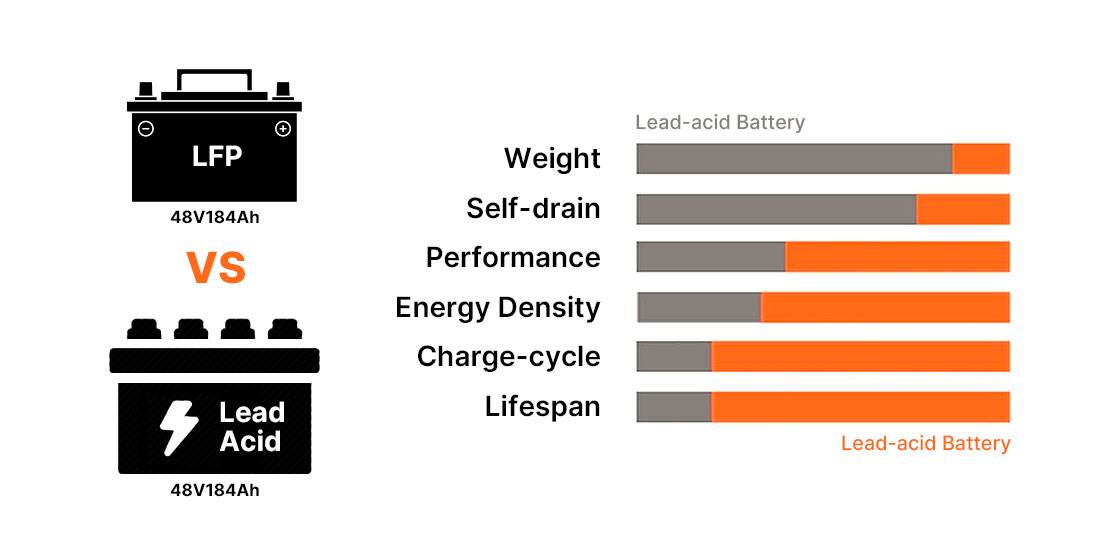
- Performance: Lithium batteries typically offer higher energy density, longer cycle life, and faster charging compared to lead-acid batteries, ensuring consistent power output over the discharge cycle.
- Weight and Size: Lithium batteries are lighter and more compact than lead-acid batteries, making them ideal for applications where space and weight are critical factors.
- Cost: While lithium batteries have a higher upfront cost, they often offer better long-term value due to their extended lifespan and lower maintenance requirements compared to lead-acid batteries.
- Safety: Lead-acid batteries are generally considered safer and more stable than lithium batteries, which can be prone to thermal runaway and fire if mishandled or damaged.
- Environmental Impact: Lead-acid batteries pose greater environmental harm due to their toxic materials and require specialized recycling processes. In contrast, lithium batteries have a lower overall environmental impact.
- Longevity: Lithium batteries offer a longer cycle life, with up to 4000 cycles compared to lead-acid batteries' maximum of 500 cycles. Despite the initial expense, lithium batteries provide higher depth of discharge and durability, ensuring a longer lifespan and safer usage.
Considering these factors, for applications where high performance, energy efficiency, and longevity are crucial, a 48V 180Ah lithium battery would generally be considered the better option. However, specific requirements and budget constraints may influence the choice between lithium and lead-acid batteries.
What quality standards does Redway Power apply to 48V 180Ah (184Ah) lithium battery?
Redway Power applies stringent quality standards to its 48V 180Ah lithium battery, ensuring reliability and safety:
- Adherence to International Standards: Redway Power ensures compliance with ISO 9001 for quality management systems and ISO 14001 for environmental management during manufacturing.
- Certifications for Safety and Compliance: The company obtains certifications like UL (Underwriters Laboratories) or CE (Conformité Européenne) to demonstrate adherence to safety and product standards.
- Rigorous Testing Procedures: Batteries undergo thorough testing, including the IEC 62133 test, to verify safety and prevent short-circuiting.
- Stringent Manufacturing Processes: Redway Power implements strict manufacturing processes to maintain consistency and quality throughout battery production.
- Comprehensive Quality Control Measures: The company employs extensive quality control measures to monitor and ensure battery quality and performance at every stage of production.
Adhering to these standards ensures that the 48V 180Ah lithium battery meets industry and regulatory requirements, guaranteeing reliable performance and safety for users.
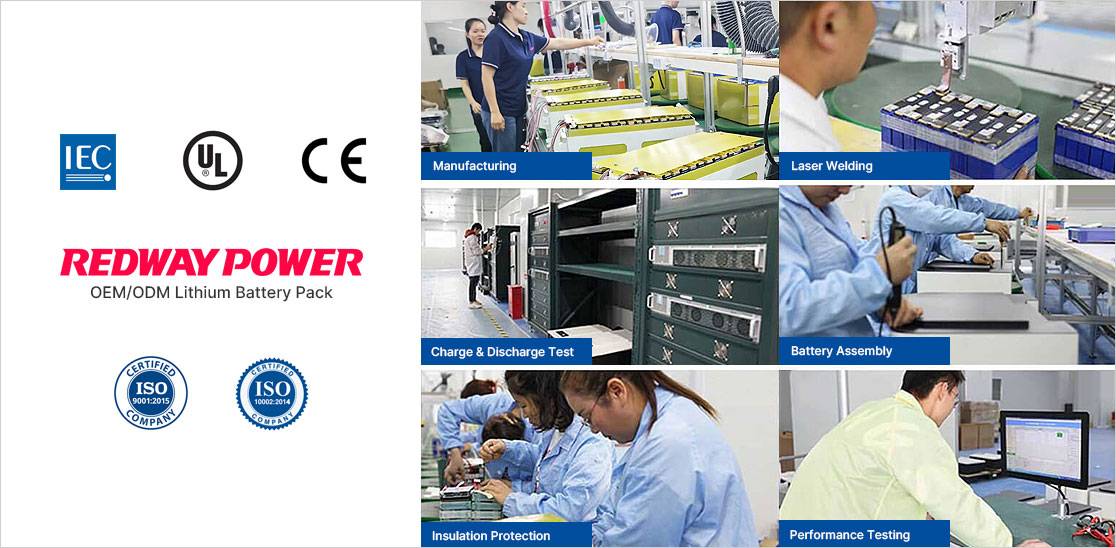
Is it safer to use a 48V 180Ah lithium-ion battery?
Using a 48V 180Ah lithium-ion battery can indeed be considered safer compared to traditional lead-acid batteries for several reasons:
- Chemical Stability: Lithium-ion batteries are chemically stable and less likely to leak or spill acid, reducing the risk of chemical exposure and environmental contamination.
- Lower Risk of Overcharging: Lithium-ion batteries come with built-in protection circuits that help prevent overcharging, thereby reducing the risk of thermal runaway and fire.
- Lightweight Construction: Lithium-ion batteries are lighter than lead-acid batteries, making them easier to handle and transport. This reduces the risk of accidents during installation or maintenance.
- Reduced Maintenance: Lithium-ion batteries require minimal maintenance compared to lead-acid batteries. They don't need periodic water refilling or equalization charging, reducing the risk of human error and potential accidents.
- Efficient Cooling: Lithium-ion batteries generally dissipate heat more efficiently than lead-acid batteries, lowering the risk of overheating and thermal runaway.
While lithium-ion batteries offer these safety advantages, it's crucial to follow proper handling, storage, and charging procedures to minimize risks further. Additionally, selecting batteries from reputable manufacturers with stringent quality control measures can enhance overall safety.
What are the features of a 48V 180Ah lithium-ion battery (metal shell)?
Encased in a durable metal shell, this 48V 180Ah lithium-ion battery boasts impressive features suitable for a variety of applications. Its high energy density enables greater storage capacity despite its compact and lightweight design, differentiating it from traditional lead-acid batteries. With extended cycle life, the battery maintains reliable performance after repeated charge and discharge cycles without significant capacity loss. Furthermore, these lithium-ion batteries offer efficient charging, minimal self-discharge, and low maintenance requirements, making them a practical and economical power source.
What are the specifications of a 48V 180Ah lithium-ion battery?
The standard requirements for a 48V 180Ah lithium-ion battery typically consist of its 48-volt voltage rating and 180 ampere-hour (Ah) capacity. Other vital factors could encompass dimensions, weight, maximum discharge current, operational temperature range, anticipated cycle life, and safety attributes such as built-in protection circuits. These specifications may differ from one producer to another and serve various purposes, highlighting the significance of consulting the datasheet or product specifications to guarantee compatibility and achieve optimum performance.
How to maintain a 48V 180Ah lithium-ion battery?
Maintaining a 48V 180Ah lithium-ion battery involves several key practices to ensure optimal performance and longevity:
- Charge Regularly: Lithium-ion batteries perform best when they are regularly charged and discharged. Avoid leaving the battery in a fully discharged state for extended periods, as this can lead to capacity loss.
- Use Correct Charger: Always use a charger specifically designed for lithium-ion batteries and follow the manufacturer's recommendations for charging voltage and current. Avoid using incompatible chargers, as they can damage the battery.
- Avoid Overcharging: Do not leave the battery connected to the charger once it is fully charged. Overcharging can degrade battery performance and shorten its lifespan. Use chargers with built-in protection against overcharging.
- Temperature Control: Avoid exposing the battery to extreme temperatures, both high and low, as it can affect its performance and lifespan. Store and operate the battery within the recommended temperature range specified by the manufacturer.
- Regular Inspection: Periodically inspect the battery for signs of physical damage, such as dents, leaks, or swelling. If any abnormalities are observed, discontinue use immediately and consult the manufacturer for guidance.
- Proper Handling: Handle the battery with care and avoid dropping or subjecting it to mechanical shocks. Secure the battery properly during transportation to prevent damage.
- Storage: If storing the battery for an extended period, ensure it is stored in a cool, dry place with a moderate temperature. Ideally, store the battery at a partial state of charge (around 50%) to minimize stress on the cells.
- Firmware Updates: Some lithium-ion batteries may have firmware that requires periodic updates. Follow the manufacturer's instructions for updating the battery firmware to ensure optimal performance and compatibility with charging systems.
By following these maintenance practices, you can maximize the lifespan and performance of your 48V 180Ah lithium-ion battery. Regular care and attention will help ensure reliable operation and safety over the battery's lifespan.
What are the do's and don'ts associated with handling and using LiFePO4 cells?
Do's:
- Use cells within their specified voltage and current ranges.
- Employ a proper Battery Management System (BMS) to protect against overcharging and over-discharging.
- Handle cells with care and use appropriate personal protective equipment (PPE).
Don'ts:
- Avoid physical damage or puncturing, which can lead to cell failure.
- Do not expose cells to extreme temperatures or direct sunlight.
- Never mix different cell types or brands in a battery pack.
What pre-installation checks and steps are recommended before using LiFePO4 cells?
- Verify that the cells match the required specifications for voltage, capacity, and current.
- Ensure the cells are compatible with your BMS.
- Inspect for any physical damage or defects before installation.
- Confirm proper balance of the cells if they are used in a pack.
- Follow manufacturer guidelines for installation and setup.
What are the important notes to consider before purchasing LiFePO4 cells?
- Check the manufacturer's reputation and warranty conditions.
- Ensure the cells have a reliable BMS included or compatible with your existing system.
- Consider the cells’ cycle life and performance specifications to meet your needs.
- Verify compatibility with your intended application (e.g., voltage, capacity).
- Compare the cost with other battery technologies to ensure cost-effectiveness.













